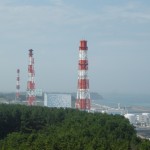Nuclear meltdown in Japan affects prospects for U.S. nuclear energy
The possible nuclear meltdown of multiple reactors in Japan following a powerful quake and tsunami may affect the prospects of a nuclear energy revival in the United States.
President Barack Obama has espoused clean energy as one of his administration's major programs. He had asked for $54 billion from Congress for nuclear energy projects in the country.
Obama had suffered setbacks with his energy agenda before, failing to convince Senators to pass a measure to curb carbon emissions and being forced to backtrack on his push for more offshore drilling after the BP disaster. With the potential nuclear meltdown in Japan, it seems nuclear energy may not be an attractive option as well, at least for now.
The magnitude of the quake that struck Japan has been revised from 8.9 to 9.0 by the U.S. Geological Survey. The quake and the tsunami broke down the cooling systems of the Fukushima Daiichi nuclear power plant.
There have been two explosions at the site, prompting authorities to evacuate residents within the immediate vicinity on radiation concerns. Without water to cool down the reactor, fuel rods may melt leading to a potential nuclear meltdown which authorities are currently working to prevent from happening.
But the administration and supporters of the new U.S. nuclear energy program seems unperturbed by the incident in Japan. Press Secretary Jay Carney said today that nuclear energy "remains a part of the president's overall energy plan."
Sen. Lamar Alexander said that U.S. reactors are "built to the highest standards in the world" and that the safety mechanisms built by the Japanese "appear to have done their job" in preventing a nuclear meltdown.
